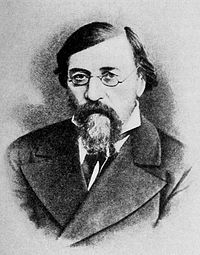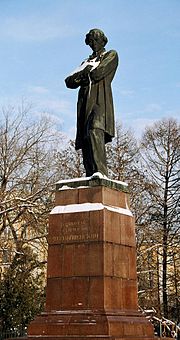- Nikolay Chernyshevsky
-
Nikolay Chernyshevsky 
Born July 12, 1828
Saratov, RussiaDied October 17, 1889 (aged 61)
Saratov, RussiaInfluenced by Vissarion Belinsky, Alexander Herzen, Ludwig Andreas Feuerbach, Ludwig Buchner, Charles Fourier, Claude Bernard, Mikhail Bakunin, Robert Owen Influenced Vladimir Lenin, Nikolay Dobrolyubov, Svetozar Marković, Maxim Gorky Nikolay Gavrilovich Chernyshevsky (Russian: Никола́й Гаври́лович Черныше́вский) (July 12, 1828 – October 17, 1889) was a Russian revolutionary democrat, materialist philosopher, critic, and socialist (seen by some as a utopian socialist). He was the leader of the revolutionary democratic movement of the 1860s, and an influence on Vladimir Lenin, Emma Goldman, and Serbian political writer and socialist Svetozar Marković.
Contents
Biography
The son of a priest, Chernyshevsky was born in Saratov in 1828, and stayed there till 1846. He graduated at the local seminary where he learnt English, French, German, Italian, Latin, Greek and Old Slavonic. It was there he gained a love of literature.[1] At St Petersburg university he often struggled to warm his room. He kept a diary of trivia like the number of tears he shed over a dead friend. It was here that he became an atheist.[2] He was inspired by the works of Ludwig Feuerbach and Charles Fourier After graduating from Saint Petersburg University in 1850, he taught literature at a gymnasium in Saratov. From 1853 to 1862, he lived in Saint Petersburg, and became the chief editor of Sovremennik ("Contemporary"), in which he published his main literary reviews and his essays on philosophy.
In 1862, he was arrested and confined in the Fortress of St. Peter and Paul, where he wrote his famous novel What Is to Be Done? The novel was an inspiration to many later Russian revolutionaries, who sought to emulate the novel's hero Rakhmetov, who was wholly dedicated to the revolution, ascetic in his habits and ruthlessly disciplined, to the point of sleeping on a bed of nails and eating only raw steak in order to build strength for the Revolution (though he finds cigars impossible to give up!). Among those who have referenced the novel include Lenin, who wrote a work of political theory of the same name. In 1862, Chernyshevsky was sentenced to civil execution (mock execution), followed by penal servitude (1864-72), and by exile to Vilyuisk, Siberia (1872-83). He died at the age of 61.
Influence
Chernyshevsky was a founder of Narodism, Russian populism, and agitated for the revolutionary overthrow of the autocracy and the creation of a socialist society based on the old peasant commune.
Chernyshevsky's ideas were heavily influenced by Alexander Herzen, Vissarion Belinsky, and Ludwig Andreas Feuerbach. He saw class struggle as the means of society's forward movement and advocated for the interests of the working people. In his view, the masses were the chief maker of history. He is reputed to have used the phrase "the worse the better", to indicate that the worse the social conditions became for the poor, the more inclined they would be to launch a revolution.
According to Professor Emeritus of Slavic and Comparative Literature at Stanford, Joseph Frank, "Chernyshevsky's novel What Is to Be Done?, far more than Marx's Das Kapital, supplied the emotional dynamic that eventually went to make the Russian Revolution".[3]
Dostoyevsky was enraged by what he saw as the naivete of the political and psychological ideas expressed in the book [4], and wrote Notes from Underground largely as a reaction against it.
Works about Chernyshevsky
- Vladimir Nabokov's The Gift has the protagonist, Fyodor Godunov-Cherdyntsev, study Chernyshevsky and write the critical biography The Life of Chernychevski which represents Chapter Four of the novel. The publication of this work causes a literary scandal.[5]
- Paperno, Irina, Chernyshevsky and the Age of Realism: A Study in the Semiotics of Behavior. Stanford: Stanford University Press, 1988.
- Pereira, N.G.O., The Thought and Teachings of N.G. Černyševskij. The Hague: Mouton, 1975.
Works
- Aesthetic Relations of Art to Reality
- Essays on the Gogol Period in Russian Literature
- Critique of Philosophical Prejudices Against Communal Ownership
- The Anthropological Principle in Philosophy
- What Is to Be Done? (1863)
- Prologue
- The Nature of Human Knowledge
References
External links
- Works by or about Nikolay Chernyshevsky in libraries (WorldCat catalog)
Categories:- 1828 births
- 1889 deaths
- People from Saratov
- Russian journalists
- Russian editors
- Russian literary critics
- Russian novelists
- Russian philosophers
- Russian revolutionaries
- Russian socialists
- Russian atheists
- Saint Petersburg State University alumni
- Former Eastern Orthodox Christians
Wikimedia Foundation. 2010.

